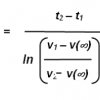2. Godel’s Incompleteness Theorem says:
“Anything you can draw a circle around cannot explain itself without referring to something outside the circle – something you have to assume but cannot prove.”
======================================
Stated in Formal Language:
“Godel’s theorem says: “Any effectively generated theory capable of expressing elementary arithmetic cannot be both consistent and complete. In particular, for any consistent, effectively generated formal theory that proves certain basic arithmetic truths, there is an arithmetical statement that is true, but not provable in the theory.”
The Church-Turing thesis says that a physical system can express elementary arithmetic just as a human can, and that the arithmetic of a Turing Machine (computer) is not provable within the system and is likewise subject to incompleteness.
Any physical system subjected to measurement is capable of expressing elementary arithmetic. (In other words, children can do math by counting their fingers, water flowing into a bucket does integration, and physical systems always give the right answer.)
Therefore the universe is capable of expressing elementary arithmetic and like both mathematics itself and a Turing machine, is incomplete.
Syllogism:
1. All non-trivial computational systems are incomplete
2. The universe is a non-trivial computational system
3. Therefore the universe is incomplete”
----------------------------------------------
You can draw a circle around all of the concepts in your high school geometry book. But they’re all built on Euclid’s 5 postulates which are clearly true but cannot be proven. Those 5 postulates are outside the book, outside the circle.
You can draw a circle around a bicycle but the existence of that bicycle relies on a factory that is outside that circle. The bicycle cannot explain itself.
Godel proved that there are ALWAYS more things that are true than you can prove. Any system of logic or numbers that mathematicians ever came up with will always rest on at least a few unprovable assumptions.
Godel’s Incompleteness Theorem applies not just to math, but to everything that is subject to the laws of logic. Incompleteness is true in math; it’s equally true in science or language or philosophy.
And: If the universe is mathematical and logical, Incompleteness also applies to the universe.
Godel created his proof by starting with “The Liar’s Paradox” — which is the statement
“I am lying.”
“I am lying” is self-contradictory, since if it’s true, I’m not a liar, and it’s false; and if it’s false, I am a liar, so it’s true. There are other sentences like this known as “Godel sentences.
So Godel, in one of the most ingenious moves in the history of math, converted the Liar’s Paradox into a mathematical formula. He proved that any statement requires an external observer.
No statement alone can completely prove itself true.
His Incompleteness Theorem was a devastating blow to the “positivism” of the time. Godel proved his theorem in black and white and nobody could argue with his logic.
Yet some of his fellow mathematicians went to their graves in denial, believing that somehow or another Godel must surely be wrong.
He wasn’t wrong. It was really true. There are more things that are true than you can prove.
A “theory of everything” – whether in math, or physics, or philosophy – will never be found. Because it is impossible.
OK, so what does this really mean? Why is this super-important, and not just an interesting geek factoid?
Here’s what it means:
* Faith and Reason are not enemies as I have defined a few posts back. In fact, the exact opposite is true! One is absolutely necessary for the other to exist. All reasoning ultimately traces back to faith in something that you cannot prove.
* All closed systems depend on something outside the system.
* You can always draw a bigger circle but there will still be something outside the circle.
* Reasoning inward from a larger circle to a smaller circle is “deductive reasoning.”
Example of a deductive reasoning:
1. All men are mortal
2. Socrates is a man
3. Therefore Socrates is mortal
* Reasoning outward from a smaller circle to a larger circle is “inductive reasoning.”
Examples of inductive reasoning:
1. All the men I know are mortal
2. Therefore all men are mortal
1. When I let go of objects, they fall
2. Therefore there is a law of gravity that governs falling objects
Notice than when you move from the smaller circle to the larger circle, you have to make assumptions that you cannot 100% prove.
For example you cannot PROVE gravity will always be consistent at all times. You can only observe that it’s consistently true every time. You cannot prove that the universe is rational. You can only observe that mathematical formulas like E=MC^2 do seem to perfectly describe what the universe does.
Nearly all scientific laws are based on inductive reasoning. These laws rest on an assumption that the universe is logical and based on fixed discoverable laws.
You cannot PROVE this. (You can’t prove that the sun will come up tomorrow morning either.) You literally have to take it on faith. In fact most people don’t know that outside the science circle is a philosophy circle. Science is based on philosophical assumptions that you cannot scientifically prove. Actually, the scientific method cannot prove, it can only infer.
(Science originally came from the idea that God made an orderly universe which obeys fixed, discoverable laws.)
Now consider what happens when we draw the biggest circle possibly can – around the whole universe. (If there are multiple universes, we’re drawing a circle around all of them too):
* There has to be something outside that circle. Something which we have to assume but cannot prove
* The universe as we know it is finite – finite matter, finite energy, finite space and 13.7 billion years time, give or take a billion years.
* The universe is mathematical. Any physical system subjected to measurement performs arithmetic. (You don’t need to know math to do addition – you can use an abacus instead and it will give you the right answer every time.)
* The universe (all matter, energy, space and time) cannot explain itself
* Whatever is outside the biggest circle is boundless. By definition it is not possible to draw a circle around it.
* If we draw a circle around all matter, energy, space and time and apply Gödel’s theorem, then we know what is outside that circle is not matter, is not energy, is not space and is not time. It’s immaterial.
* Whatever is outside the biggest circle is not a system – i.e. is not an assemblage of parts. Otherwise we could draw a circle around them. The thing outside the biggest circle is indivisible.
* Whatever is outside the biggest circle is an uncaused cause, because you can always draw a circle around an effect. You may apply the KALAM argumrnt here as well.
https://www.youtube....aid=P-1W946Ozbo
https://www.youtube....aid=P-vYh39vLfk
https://www.youtube....aid=P9YN6-BvSIo
First, even if all of this were true, I don't see how this could possibly be evidence for a deist, let alone a theist. Someone from Islam, or Mormonism, or greek mythology could all argue the exact same thing to support their position. It is certainly NOT evidence for theism.
If anything it suggests that it would be impossible for God to be all knowing, because there will always be statements that cannot be proved or disproved.
"And: If the universe is mathematical and logical, Incompleteness also applies to the universe."
This is exactly what you have not proved: the premise that the universe is mathematical and logical.
"You can only observe that mathematical formulas like E=MC^2 do seem to perfectly describe what the universe does."
Except nothing in physics ever measures something perfectly. There is always a margin of error, albeit it is often extremely small. Considering there are an infinite number of decimal places, you're still an infinite order of magnitudes away from a perfect measurement. Seem is also an interesting word. E =mc^2 may not apply in the center of a black hole, or in the first planck second of the universe.
" The universe as we know it is finite – finite matter, finite energy, finite space and 13.7 billion years time, give or take a billion years."
Actually we don't know that there is finite space in the universe. It could be infinite. Show me scientific data before throwing out a huge claim.
"The universe (all matter, energy, space and time) cannot explain itself"
God cannot explain itself.
" * There has to be something outside that circle. Something which we have to assume but cannot prove"
There has to be something outside God. Something which we have to assume but cannot prove. Your two dimensional arguments are bad. If the universe is contstructed out of 13 dimensions, then outside has no meaningful definition. Perhaps there are an infinite number of dimensions.
"If there are multiple universes, we’re drawing a circle around all of them too"
If there is a God, we're drawing a circle around him/her/it too.
Edited by serp777, 26 July 2014 - 07:56 PM.
































 This topic is locked
This topic is locked
























